Share
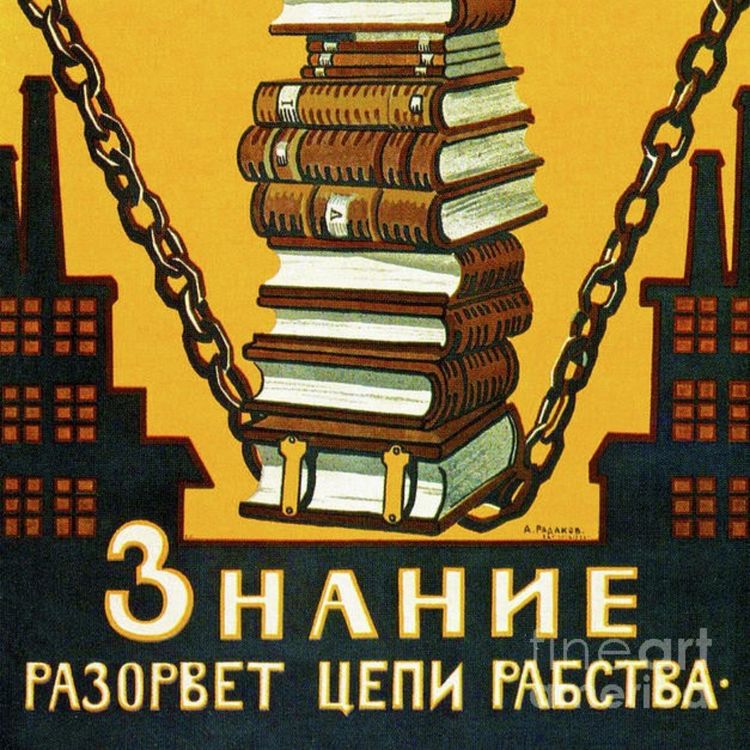
The Eurasian Knot
Soviet Modernity
Crucibles of Power: Smolensk under Stalinist and Nazi Rule Showcasing the Great Experiment: Cultural Diplomacy and Western Visitors to the Soviet Union, 1921-1941Crossing Borders: Modernity, Ideology, and Culture in Russia and the Soviet UnionMichael David-Fox began writing Soviet history in a dynamic period. The Soviet Union had just collapsed, archives were flung wide open, and scholars began exploring new ways to conceptualize the Soviet century. And you can read this in David-Fox’s work–a bricolage of historiography, history of knowledge, cross-cultural exchange, politics, power, and the nature of the modern age. As one of founds of Kritika, he’s made his mark on the field. The Eurasian Knot talked to David-Fox about his career, his driving concepts and methods, and the particularities of Soviet modernity.
Guest:
Michael David-Fox is the Director of the Center for Eurasian, Russian, and East European Studies at Georgetown University and Professor in the School of Foreign Service and Department of History. He is founding and executive editor of Kritika: Explorations in Russian and Eurasian History and author of several books on Soviet history. His most recent book is Crucibles of Power: Smolensk under Stalinist and Nazi Rule published by Harvard University Press.
Books discussed in this episode:
- Revolution of the Mind: Higher Learning among the Bolsheviks, 1918–1929.
- Crossing Borders: Modernity, Ideology, and Culture in Russia and the Soviet Union.
- Showcasing the Great Experiment: Cultural Diplomacy and Western Visitors to the Soviet Union, 1921-1941.
- Crucibles of Power: Smolensk under Stalinist and Nazi Rule.
More episodes
View all episodes
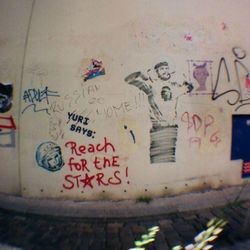
Post-Soviet Graffiti
54:59|I love street art. And I don’t care in what form. Beautifully crafted murals. Spraypainted gang tags. Scrawls on bathroom stalls. Even guerilla sticker mosaics on streetlights. I especially like how street art alters the narrative of a space. So, I was excited when I received a copy of Alexis Lerner’s book, Post-Soviet Graffiti. Post-Soviet street art has gotten little scholarly attention making the topic ripe for exploration and discussion. Post-Soviet graffiti shares a lot with its global counterparts–similar aesthetics, themes, culture, and political edginess. It also shares attempts at its co-optation by governments and corporations. But what makes political street art different in authoritarian countries like Russia? Is its power to circumvent media censorship and political control? What is street art, anyway? Who are the artists? And does graffiti have a political impact? The Eurasian Knot spoke to Alexis to get her thoughts and discuss the content and form of some of the graffiti she’s encountered over the last decade.Guest:Alexis Lerner is an Assistant Professor of Political Science at the United States Naval Academy. She’s the author of Post-Soviet Graffiti: Free Speech in Authoritarian States, published by University of Toronto Press. You can see the Alexis’ gallery of graffiti at https://postsovietgraffiti.com/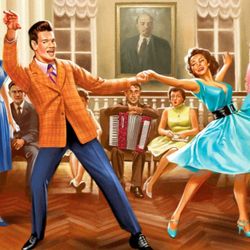
The Stiliagi
01:02:52|A new youth subculture emerged in the Soviet Union in the late 1940s and early 1950s–the Stiliagi. Roughly translated as “the stylish,” these youths, the majority of whom were men, wore flashy hairstyles and bright colored clothes, danced to jazz, and were obsessed with Western aesthetics. And of course, this style broke Soviet conventions, challenged social norms, and expanded gender performance. Though the exact origin of the Stiliagi is murky, it arose alongside other Western youth subcultures–the beatniks, the mods, the rockers–of the immediate post-WWII libertinism. The Stiliagi put the Soviet Union squarely within the history of a more globalized youth culture. But, what did it mean to be a “stiliagi”? Who were they? How did the style offer alternative forms of Soviet masculinity? How did the Soviet authorities react to these youths? And how did this subculture differ from its Western counterparts? The Eurasian Knot spoke to Alla Myzelev about her new book on the subculture, Stiliagi and Soviet Masculinities, 1945–2010: Fashion as Dissent, to get some answers.Guest:Alla Myzelev is a Professor and Chair of the Department of Art History and Museum Studies at SUNY Geneseo. She is currently editing a book titled Challenging Imperial Narratives Through Visual Art and Material Culture in Eastern Europe and Central Asia. Her new book, Stiliagi and Soviet Masculinities, 1945–2010: Fashion as Dissent, is published by Manchester University Press.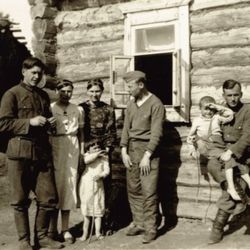
Fraternization and Survival During WWII
39:36|Soviet ideology called for the emancipation of women. Soviet women would be active participants in public life, unburdened by the home, children, and husbands, and serve equally in the building and defense of the Soviet state. Reality, however, was different, especially during WWII. Soviet women did serve in the Red Army and partisans. But life at war was more than the heroic tales we know today. Soviet women were often abused by their commanders and fellow soldiers or viewed as suspicious, weak, and even dangerous. Life under occupation was even worse. Many women turned to “survival prostitution” and fraternized with German soldiers to escape abuse, forced labor, and death. What strategies did Soviet women adopt to survive the war? How were they looked upon by the enemy, their neighbors, and compatriots? And what happened after the war to those who formed sexual relations with German soldiers? The Eurasian Knot spoke to Regina Kazyulina about gender, sex, and survival to get a window into this contentious and understudied chapter of WWII in the Soviet Union. Guest:Regina Kazyulina is a visiting assistant professor of history and the assistant director of the Center for Holocaust and Genocide Studies at Salem State University. Her book, Women Under Suspicion: Fraternization, Espionage, and Punishment in the Soviet Union During World War II published by University of Wisconsin Press.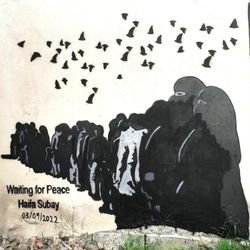
The Art of War
39:57|About two years ago, I was brought on to a podcast project started by the Global Studies Center at the University of Pittsburgh. The initial pitch was to produce a student-led podcast featuring two threatened artists that are part of the Pittsburgh Network for Threatened Scholars (PiNTS). I’m proud to feature the end result, The Art of War. It features two artists, the Yemeni street artist, Haifa Subay, and the Ukrainian poet, filmmaker, and musician, Oleksandr Fraze-Frazenko, about exile, art, war, and adjusting to life in Pittsburgh. I hope Eurasian Knot listeners enjoy it because I’m really proud of having been a part of it. And especially, seeing how our students, Jojo Ellis, Kyla Parker, and Lily Acharya proved to be naturals in the audio craft.Art of WarProduced by Lily Acharya, Jojo Ellis, Kyla Parker, David Greene, Shannon Reed, and Sean Guillory.Editing and sound design: Sean GuilloryMixed and mastered; Daniel Cooper, Podcuts EditingMusic: Blue Dot Sessions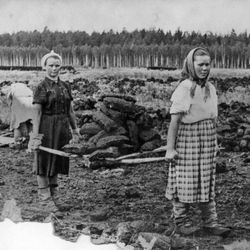
How Peat Electrified the USSR
50:17|What is peat? We had no idea until the Eurasian Knot spoke to Katja Bruisch about how this coal-like soil was an energy source in Russia and the Soviet Union. Found in wetlands, peat is the extracted top soil that is dried and burned for fuel. It was a marginal, but important, energy source in industrialization. Peat was also used as a localized source to produce electricity for Lenin’s Electrification campaign. Because, as the old man put it, “Communism is Soviet power plus the electrification of the whole country.” But, Bruisch tells us, extracting peat was labor intensive, and into the Soviet period, increasingly done by women. Peat harvesting created communities and culture. It also significantly altered local ecologies. How crucial was peat in modernization? Why was it used instead of other energy sources? And can it serve as a present-day alternative? The Eurasian Knot posed these questions and more to Katja Bruisch about her book, Burning Swaps: Peat and the Forgotten Margins of Russia’s Fossil Economy published by Cambridge University Press.Guest:Katja Bruisch is an environmental historian at Trinity College Dublin interested in energy, resource extraction and land-use in the Russian Empire and the Soviet Union. Her new book is Burning Swamps: Peat and the Forgotten Margins of Russia’s Fossil Economy published by Cambridge University Press.Send us your sounds! PatreonKnotty News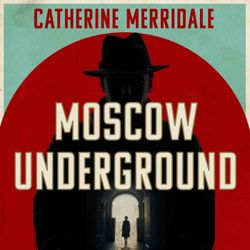
Murder Mystery in Moscow
01:03:41|I’ve grown to admire historians like Catherine Merridale. You know, those historians who buck academic conventions to write for a non-academic audience. This was quite a change for me since I used to hold such work in contempt (or was it jealousy) when I was a snot-nosed, snobby grad student. So I jumped at the chance to interview Merridale and talk about the historical craft and its relationship to detective fiction in her first novel, Moscow Underground. As she explains, there’s some liberation in fiction. You can freely develop characters. Imbibe the story with emotions, the sites, the sounds, the smells. And craft a compelling and entertaining story. But creative license has its limits. Historical fiction requires you to stick to the historical record. You have to make sure the history you set your story in is believable, as Merridale does, in her crafting of Moscow of 1934. What challenges does writing fiction present to a professional historian? How does fiction and history intersect? And why a novel at all, let alone a detective novel? The Eurasian Knot spoke to Catherine Merridale about her hero, Anton Markovich Belkin, an investigator for the Procuracy, and the murder investigation that takes him into Moscow’s two undergrounds–the metro and the underbelly of crime, poverty, and politics in her first novel, Moscow Underground. Guest:Catherine Merridale is an acclaimed historian of Russia and the Soviet Union. Her work includes pioneering oral history as well as archival research on topics as varied as death, the Kremlin, and Lenin's train ride of 1917. With Russia now off-limits for political reasons, she now turns to fiction. Moscow Underground is her first novel, set primarily in 1934.Send us your sounds! PatreonKnotty News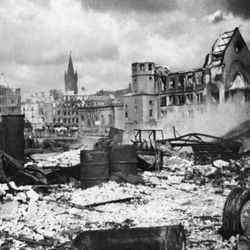
How Konigsberg Became Kaliningrad
01:05:49|The Prussian city of Konigsberg is well-known as the birthplace of Immanuel Kant. But in many ways it’s also a microcosm for the twentieth century. Founded in the 13th century by Teutonic knights, the city served as a key trading center for the Prussian Empire until the Polish corridor severed it from Germany after WWI. It is then that the history of Konigsberg takes an even more dramatic turn. Its “Germanness” became an object of debate and political exploitation. By the early 1930s, it had one of the highest votes for the Nazis in Germany. But then–WWII. Destroyed and depopulated by 1944, it became the first city to satisfy the Red Army appetite for revenge rape and pillaging. It became a Soviet possession after WWII and, like the rest of Eastern Europe, was sovietized into Kaliningrad. And even though the USSR is no more, it remains a part of the Russian Federation.The history of Konigsberg/Kaliningrad begs so many questions. Why Nazism? What was life there during the war? The Red Army violence but also its reconstruction into Kaliningrad? How did the Soviets handle their mortal German enemies after a war of annihilation? And how is this legacy seared into the city? The Eurasian Knot wanted to know more and turned to Nicole Eaton to learn more about her book, German Blood, Slavic Soil: How Nazi Königsberg Became Soviet Kaliningrad.Guest:Nicole Eaton is Associate Professor of History at Boston College where she teaches courses on the Soviet Union, Imperial Russia, modern Europe, authoritarianism, and mass violence. She’s the author of German Blood, Slavic Soil: How Nazi Königsberg Became Soviet Kaliningrad published by Cornell University Press.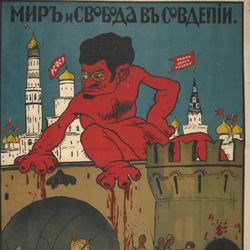
The Judeo-Bolshevik Myth
46:23|I’ve been thinking about the use of “they” in our political rhetoric. In some respects, this third-person plural pronoun is indicative of politics. The “they” in politics often refers specifically to an entity–political party, a group of politicians, etc. But what if the “they” refers to another nebulous entity? For example, here’s a clip from a recent NYT Daily episode on Charlie Kirk’s memorial: “They also had a goal of gaining control of the media and Hollywood so they could change the culture in America. They kill and terrorize their opponents, hoping to silence them.”Who is this “they”? This reminded me of an interview I did with Paul Hanebrink from 2019 about his book A Specter Haunting Europe: The Myth of Judeo-Bolshevism. Hanebrink gives a good history of one “they” that is at the center of the Judeo-Bolshevik myth–a conspiracy that I think is the foundation of most conspiracy thinking–a shadowy “they” that is behind all social ills. How has the Judeo-Bolshevik myth shaped the 20th century? How did it change over time? And what resonance does it have today? To get some insight, give this interview with Paul Hanebrink another go.Guest:Paul Hanebrink is a Professor of History at Rutgers University specializing in modern East Central Europe, with a particular focus on Hungary, nationalism and antisemitism as modern political ideologies, and the place of religion in the modern nation-state. He’s the author of In Defense of Christian Hungary. His most recent book is A Specter Haunting Europe: The Myth of Judeo-Bolshevism published by Harvard University Press.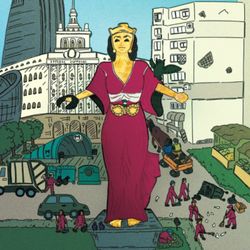
Romani, Waste, and Race in Bulgaria
53:29|There’s a paradox at the center of Elana Resnick’s book, Refusing Sustainability: Race and Environmentalism in a Changing Europe. EU policies of environmental sustainability in Bulgaria require the racialization of Romani into a permanent low-skilled and impoverished workforce. Waste management required teams of Romani streetsweepers and trash collectors to sort trash into waste, recyclables and compost, and bring them for processing and reuse. This labor was historically filled by Bulgaria’s Romani citizens, to the point where white Bulgarians equated them with waste. And in turn, Roma’s racial otherness allowed white Bulgarians to enter a pan-European concept of whiteness. Since race is a favorite subject on the Eurasian Knot, Sean spoke to Elana about Sofia’s Romani women as waste workers, the powerful solidarity and collective action that emerges from their labor, and the implications for Romani rights struggle in Bulgaria.Guest:Elana Resnick is an Assistant Professor of Anthropology at the University of California, Santa Barbara, where she also leads the Infrastructural Inequalities Research Group. She’s the author of several articles and the book, Refusing Sustainability: Race and Environmentalism in a Changing Europe, published by Stanford University Press.Send us your sounds! PatreonKnotty News